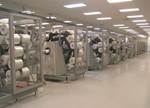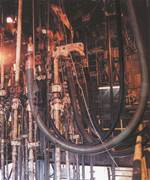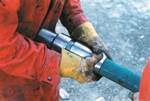Ongoing Research And Onshore Applications Lead The Way
Deep subsea developments require integrated service umbilicals (ISUs) to transport hydrate control fluids, such as methanol, and hydraulic fluids to control valves at subsea wellheads. ISUs are typically made from small-diameter (typically 0.25 inches/6.5 mm up to 2 inches/50 mm) stainless steel tubes and/or s
Deep subsea developments require integrated service umbilicals (ISUs) to transport hydrate control fluids, such as methanol, and hydraulic fluids to control valves at subsea wellheads. ISUs are typically made from small-diameter (typically 0.25 inches/6.5 mm up to 2 inches/50 mm) stainless steel tubes and/or steel braided hoses that are cabled together into a 4 to 8 inch/100 to 200 mm diameter bundle. The bundles are jacketed with abrasion-resistant material, for protection from the rough seafloor terrain and heavy currents. ISUs also contain armor, electric power lines and fiberoptic data lines, as well as weighting materials to make the entire package negatively buoyant. In 1999, nearly 1 million feet of ISUs were installed in the Gulf of Mexico alone and that number is expected to rise in the future.
Hydril Advanced Composites Group (Houston) has developed prototype spoolable carbon composite tubing to replace steel in ISU applications. Produced in diameters of 0.5 inch, 1.5 inches and 2 inches/13 mm, 38 mm and 50 mm, the tubing is capable of up to 10,000 psi/700 bar operating pressure. The development program shows at least 10 percent cost savings as compared to metallic tubing, with even lower costs possible, depending on the liner material that is chosen. Significant weight savings are also possible, on the order of 1 lb/ft, for a “six-around-one” design, or six tubes helically wrapped around a single center tube.
Though deepwater applications of bonded spoolable composite pipe are still on the horizon, pending qualification, onshore use continues to prove the benefits of composites. In one application, an independent oil and gas operator in California was constrained by surrounding residential and commercial growth and could not easily install production lines. He opted for a portable production unit, but needed a robust spoolable downhole product to reach numerous wells in awkward locations. Hydril supplied its spoolable carbon composite (SCC) tubing, which so far has seen over 400 cycles of unspooling and respooling without a problem.
ABB Offshore Systems AS (Billingstad, Norway) is currently working on an 8 inch/203 mm spoolable riser, designed for high-temperature operation in ultra-deep water and harsh environments. “We trust that the ABB spoolable composite riser will be a viable alternative to current flexible risers in the North Sea as well as an enabling technology for ultra deepwater developments out of West Africa and other areas,” said Lars Slagsvold, Project Manager for ABB Offshore Systems. ABB’s project is explored in greater detail in the discussion of drilling and production risers and drill pipe found in Chapter 6.
Related Content
-
Braided composites enable low-cost, high-rate fabrication
CAMX 2025: A&P Technology highlights its QISO and slit tape thermoplastic material capabilities through customer examples and industry applications.
-
Aerospace prepregs with braided reinforcement demonstrate improved production rates, cost
A recent time study compares the layup of a wing spar using prepreg with A&P’s TX-45 continuous braided reinforcement versus traditional twill woven prepreg.
-
Co-molding SMC with braided glass fiber demonstrates truck bed potential
Prepreg co-molding compound by IDI Composites International and A&P Technology enables new geometries and levels of strength and resiliency for automotive, mobility.



